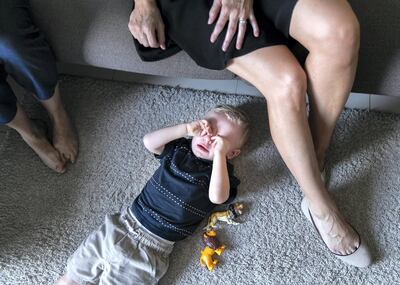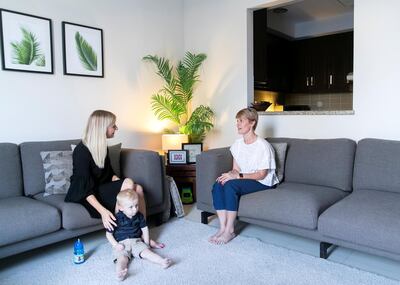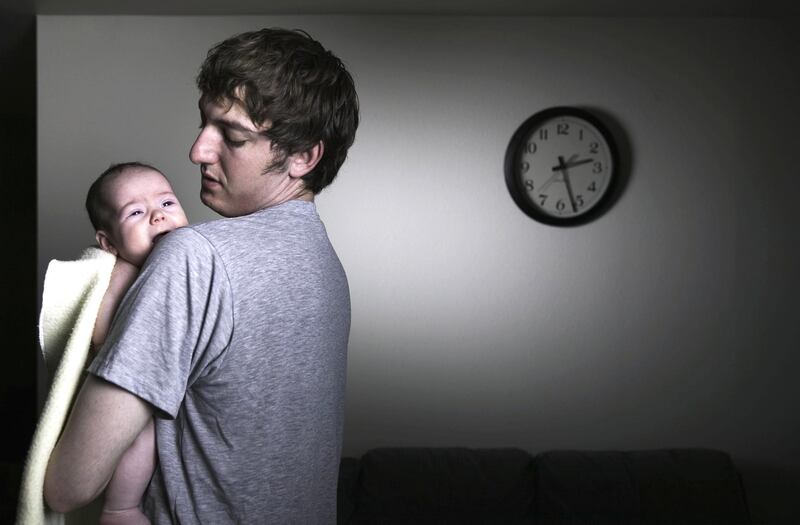The picturesque scene of sitting in a rocking chair and singing your baby a lullaby to put him or her to sleep is a myth. The reality, from first-hand experience, is more like so: from 10pm to 5am, a baby will wake up every two to three hours and wail at the top of her lungs until a parent or other caretaker picks her up and tries endlessly to put her back to sleep – sometimes by way of a maniacal dance or a last-resort breast offering.
Sleep deprivation, then, is a legitimate, unexaggerated side effect of parenthood. Most new parents are perpetually exhausted and a growing number are, perhaps understandably, recruiting professional sleep trainers to help adjust their baby’s routines.
While newborns require milk around the clock, causing mothers to wake up every few hours to feed them, many parents eventually taper out the night feeds, and attempt to train their babies to sleep through the night. Claudine Gillard, a Sleep Sense consultant from Abu Dhabi, and Hayley Bukhamsin, an infant sleep educator from Dubai, both emphasise that they do not condone the typical practice of sleep training and instead offer gentler, parent-led approaches tailored to each family.
Leaving babies to cry is not the solution
Sleep training has controversial connotations, since many methods encourage parents to let their babies cry for long periods of time before attending to them. Cruel as it may sound, variations of the so-called “cry it out” method are popular among parents; the Ferber method, for instance, involves letting your baby cry for a fixed amount of time before consoling them, with the number of minutes incrementally increasing each time.

"There's a common misconception that sleep training simply means that the child will be left to cry alone until they eventually fall asleep exhausted, but this is not the only method of sleep training," says Gillard, who was trained by Dana Obleman, author of The Sleep Sense Program. "I will never ask parents to leave their baby to cry, even for a minute. I'll never ask them to ignore their baby's communications or needs," adds Bukhamsin, whose nom de plume is "The Gentle Mama".
Roh Hafez, a psychologist at Moving Forward Counselling in Dubai, warns of the potential long-term effects of ignoring your baby’s pleas for comfort. “Leaving babies to cry unattended [comes with the] risk that they will grow up with a style of attachment that might reflect anxiety,” she says. “They will have an untrusting and negative impression of life.” Meeting infants’ needs, on the other hand, conveys the message that they are safe and need not stress. “Feeling safe with the mother, and trusting her to understand and satisfy needs is the seed of having a secure attachment, which greatly influences outlook on life and relationships,” Hafez adds.
We need to change our expectations
The fundamental flaw, argues Bukhamsin, lies with the societal expectation that babies should be taught to sleep through the night.

“Sleeping through the night is like a developmental milestone, much like walking, but it cannot be forced on a baby before they are ready,” she says, suggesting that the prospect of sleep-training your baby so you can get more sleep is self-serving, and that the child’s needs should be prioritised. “Parents are under the immense pressure of expectations from society and family to go against their intuition and their baby’s needs, to make infant sleep less of an ‘inconvenience’ in this busy modern lifestyle,” she says.
According to a 2001 study by Beth Goodlin-Jones et al, most year-old babies still wake up at night, while a 1991 study by Anat Scher showed that 50 per cent require support from adults to go back to sleep. "And yet, society still expects babies to switch off from 7pm to 7am and, as such, people believe that anything different requires training to 'fix' it. This expectation is unfounded and creates so much angst, frustration and worry. If parents were all educated about normal biological infant sleep, and expectations were developmentally appropriate, sleep would become far less of an issue for so many," says Bukhamsin. That said, many working parents don't have the luxury of sleeping (or not) when their baby does.
Bespoke baby sleep packages
Instead of a one-formula-fits-all solution, Bukhamsin and Gillard offer customised packages depending on their clients' situations. Factors such as the child's age, and whether they have siblings, will affect individual schedules. Gillard, who has trained more than 150 children from newborns to 10 year olds, starts with a telephone consultation, followed by a home visit to help parents create a better sleep environment and schedule for their baby. If they need additional support, she is available via phone calls and messages for about two weeks after, all for Dh2,500.

“I create a customised child-centric, parent-led sleep plan for each family I work with. It’s a schedule for 10 days and nights of when to eat and sleep,” she explains. “My aim is to ensure that the parents always feel empowered in managing their child’s bedtime independently of me. The child acquires the skills of self-soothing and self-reliance, giving them the confidence in their own abilities to fall asleep at bedtime and to go back to sleep if they wake up in the night.”
Bukhamsin’s method also involves a personalised approach. For Dubai families, she offers in-home consultations for Dh1,395, and for other countries, speaks to them over video calls that last up to two hours, for Dh995. “We look at the baby’s sleep, what’s normal, what can be improved, and essentially co-create a strategy, which I then write up as part of a customised sleep strategy package. It’s vital that this is a collaborative process, as my approach ensures parents are never asked to do anything they’re not comfortable with, or that doesn’t fit with their family,” she says.
When to start the process
As to when to start the process, parents can start preparing even before their child is born, says Gillard. “Sometimes I have expectant parents reach out to me as they prepare for their baby’s birth and want to ensure as ideal an environment as possible,” she says, explaining that babies between five and seven months respond the fastest to sleep training. “This is due to their stage of development and maturity – they’re young enough to not really notice the changes, but old enough to tolerate structure and routine,” she says.
Gillard likens sleep training to a rollercoaster ride. “Like all stages of parenting, it is a process that takes both time and patience,” she says. And while the whole ordeal may seem gruelling at times, remaining steadfast is the only way to see results. The secret to your child’s (and ultimately, your) sleep, she says, is consistency because “the key to success in all aspects of a child’s life, regardless of age, is routine”.





